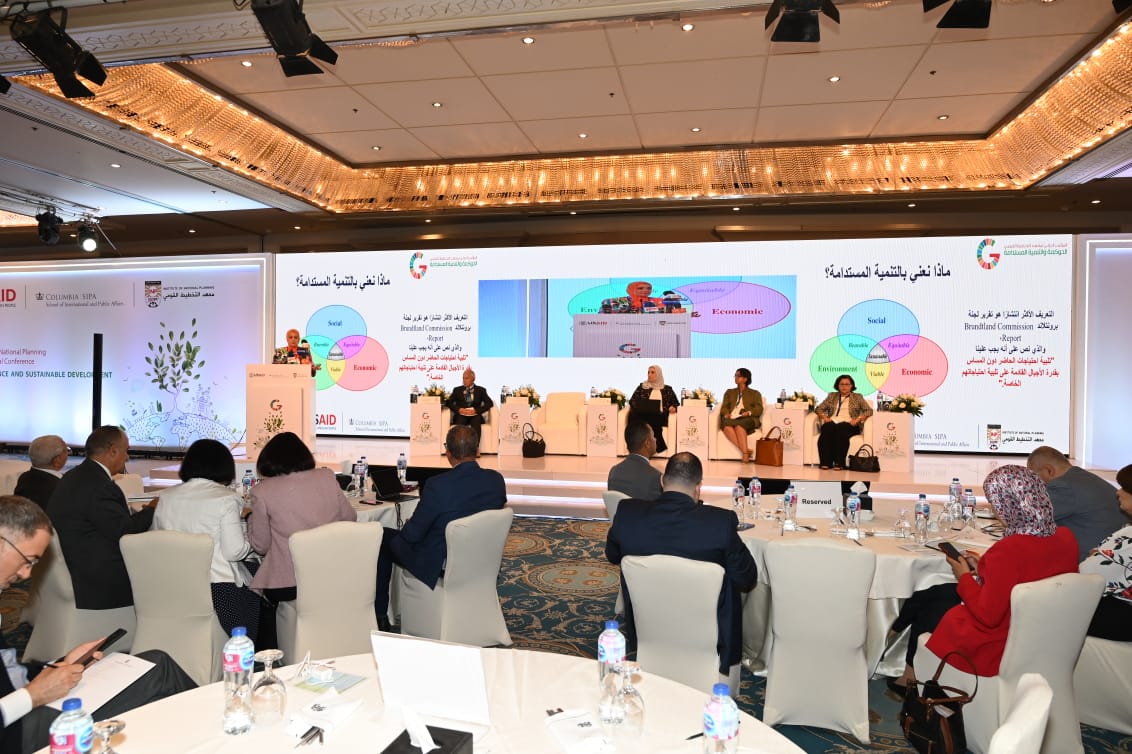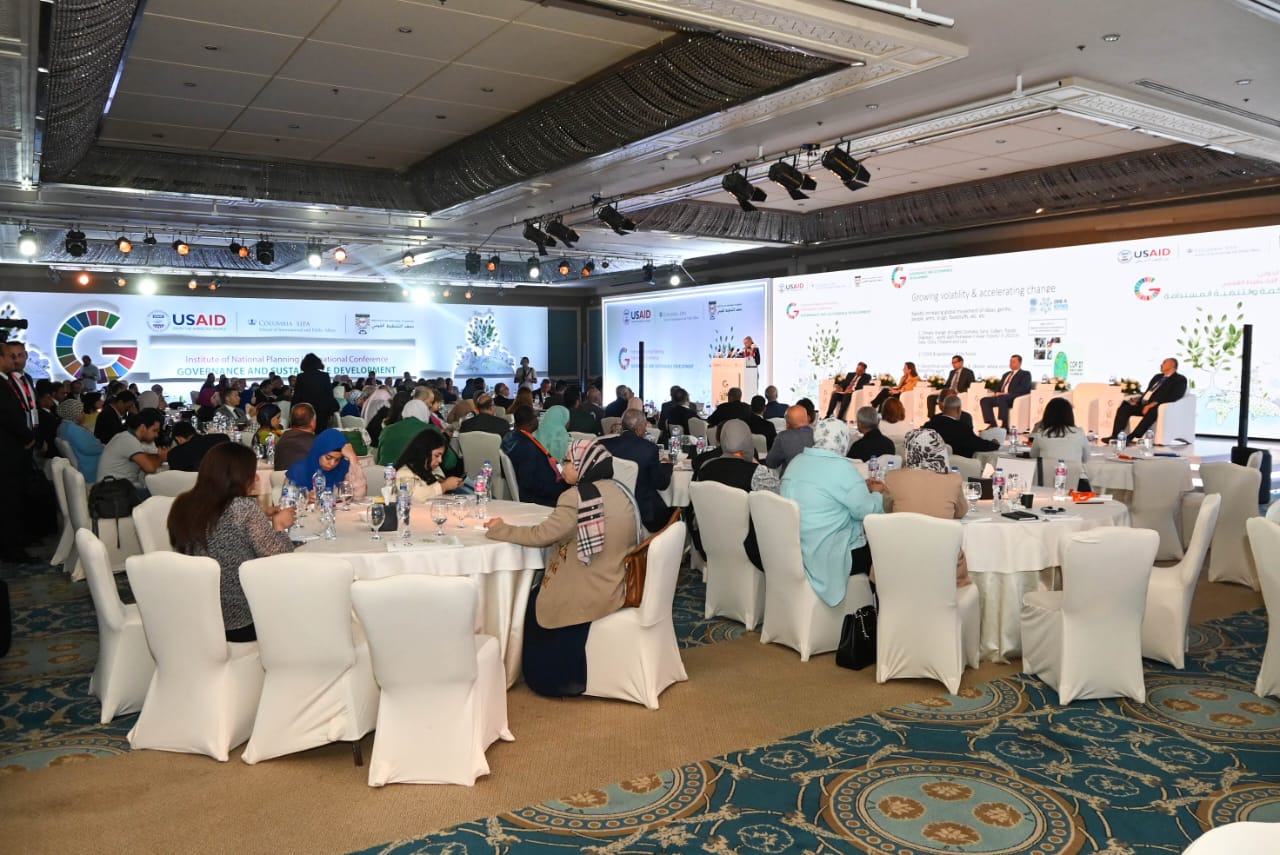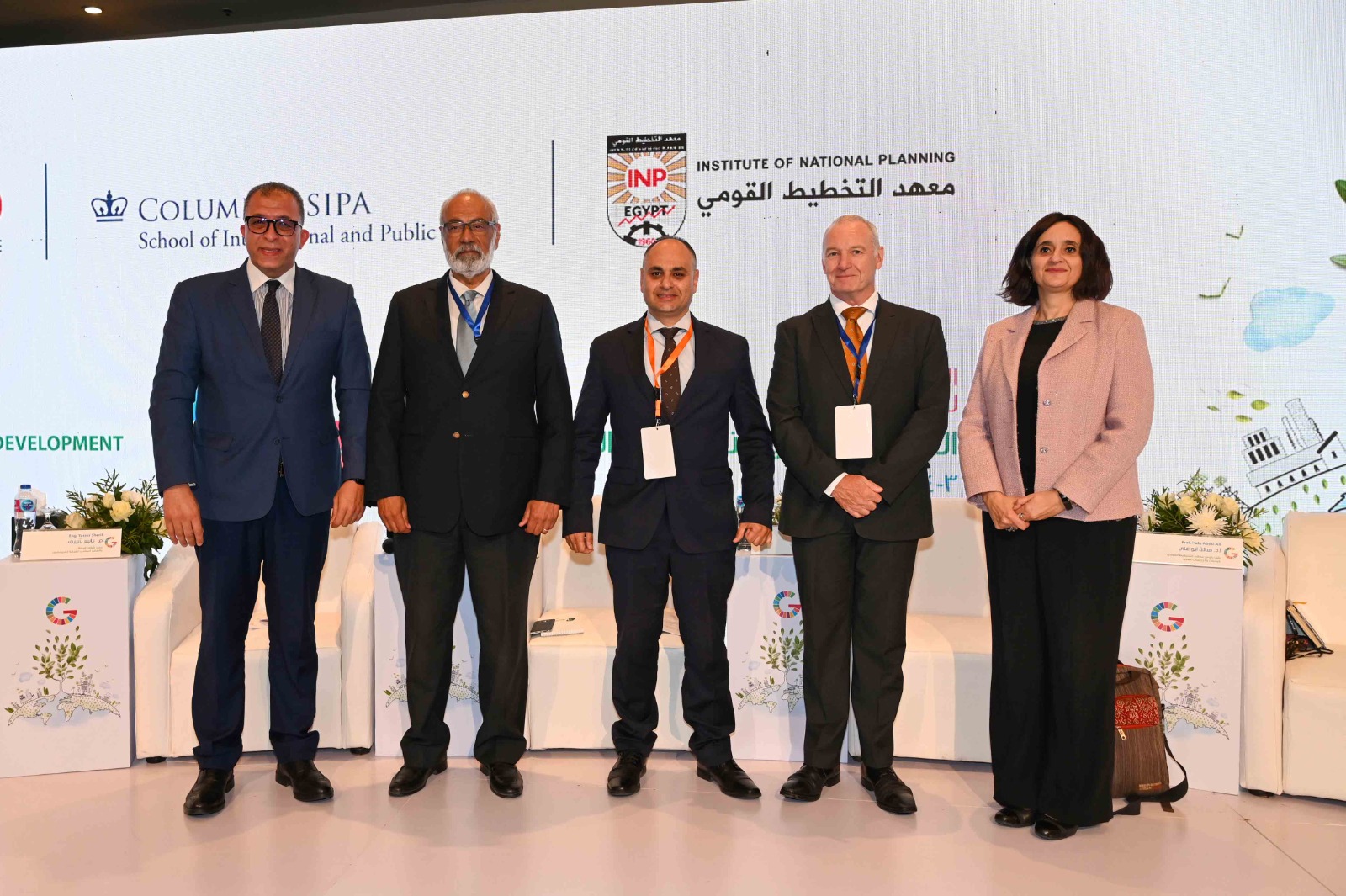The International Conference of the Egyptian National Planning Institute under the title “Governance and Sustainable Development”, which is organized by the Egyptian National Planning Institute in cooperation with the Economic Governance Project funded by the United States Agency for International Development (USAID) and the School of International and Public Affairs (SIPA) at Columbia University, continued the activities of the second day with two sessions. Two discussions on the environmental dimension of governance, the first session of which was entitled “The Role of Governance in Supporting the Environmental Dimension of Sustainable Development”, and the second session was entitled “Environmental Governance and Climate Change”.
Dr. Laila Iskandar, former Egyptian Minister of Environment, Urban Development and Informal Settlements, chaired the session on “The Role of Governance in Supporting the Environmental Dimension of Sustainable Development”, followed by keynote speakers Dr. Dong Gu and Dr. Ani Wang, who discussed “Developing a System for Urban Sustainability Indicators: A Participatory Approach”, where he indicated Dr. Dong Ju, that the urban transformation in China has reached 40%, stressing that the urban transformation will be greater in Africa and Asia during the next 20 years.
Speaking of sustainability indicators, Joe explained that they must be relevant, as after counting them, it was concluded that their number is 360, and it is not possible to work through them all, and the relative weight of each indicator must be determined. When the indicators are similar between cities, we give them one relative weight.

Then, Eng. Eman Taha, Dr. Hassan Al-Ghazouli, Dr. Ali Al-Najjar, and Dr. Sami Ayyad spoke about “Exploring the Role of Geographical Artificial Intelligence in Urban Governance towards Supporting Sustainable Development” where Eng. Iman Taha said that urban governance refers to the way the (local) government decides (regional, national) and stakeholders how to plan, finance and manage urban areas.
She pointed out that the rapid urbanization led to the loss of soil carbon and the shift in agriculture from fertile soils to marginal soils.
She pointed out that the goal of “geospatial artificial intelligence” is a subfield of artificial intelligence that deals with the application of machine learning, deep learning, and other artificial intelligence techniques to geospatial data and information.
After them, Dr. Khaled Adour spoke about “Ocean Governance for the Sustainability of Marine Resources.” He said: There are problems and statistics for the exploitation of marine resources in the oceans, which are the rise in ocean temperature, sea level rise, and the effects on the distribution of marine species, marine ecosystems, and ocean acidification.
He also discussed the issue of global fisheries in terms of species and numbers of global fisheries and the objectives of global fisheries management, stressing the need to expedite the development of regional, national and local implementation tools for regions and countries that have not yet begun the stage of interest in the sustainability of marine resources.
He added that developing countries in particular should accelerate the initiative to demarcate more marine protected areas in order to control the spread of pollutants and environmental impacts.

Commenting on the session, Dr. Abdel Aziz Ibrahim, Head of the Agricultural Policy Analysis Department at the Center for Agricultural Planning and Development, Egyptian National Planning Institute, said: The phenomenon of global warming resulting from the concentration of gases is the main cause of climate change, then he touched on the effects of climate change, stressing that it affects water security. Due to the decline in surface and groundwater resources, it also affects human health by exacerbating existing health problems, as well as affecting biodiversity, rural areas, cities, food security, political and social security, in addition to the occurrence of some disasters such as floods.
Ibrahim also commented on the composite indicators and fingerprints for measuring climate change, explaining that they include the environmental performance index, the climate change performance index, and the global green economy index in addition to the carbon footprint. Then he talked about the methodology for analyzing the environmental footprint, pointing out that the environmental footprint analysis measures the impact of human activity. On nature, the environmental footprint expresses the land area required for nutrition, resource provision, energy production, waste absorption, and re-absorption of carbon dioxide from fossil fuels through photosynthesis.

Dr. Nafisa Abu Al-Saud, Head of the Environmental Planning Department at the Environmental Planning and Development Center, Egyptian National Planning Institute, added: Talking about the general environmental system is very important as a source of natural resources, whether living or non-living, and using them in a rational manner to maintain the environmental balance of the oceans. Hence the general balance, noting that ocean governance and its link to the Sustainable Development Goals, Goal 14 as well as institutional tools and legislation is important and vital.
Referring to the paper on ocean governance for the sustainability of marine resources, it is considered one of the first researches in this field, as the agreements include clauses to support the parties to them towards greater commitment, through technical clauses that help the participating countries to do research to bridge any gap in the agreement, and assist in its implementation.
Abu Al-Saud also suggested the existence of two policy papers that the institute and research bodies could work on: a policy paper on opportunities to benefit from agreements in the field of oceans for the development and sustainability of marine resources, and another on the impact of ocean governance on the impact of climate change in general.
While the last session of the conference discussed “Environmental Governance and Climate Change” and was chaired by Dr. Hala Abu Ali, Vice President of the Egyptian National Planning Institute for Research and Graduate Studies. Through video conference, Dr. Khaled Fahmy, former Egyptian Minister of Environment, Head of the Environmental Economics Department at the Environmental Planning and Development Center, Egyptian National Planning Institute, Dr. Ali Abu Sunna, CEO of the Egyptian Environmental Affairs Agency, Mark Ahern, Senior Economist, World Bank Egypt Office, and Engineer Yasser Sharif, expert Environmental Affairs and Managing Director of “Environics” Company.

Dr. Khaled Fahmy, the former Egyptian Minister of the Environment, spoke about climate change and its relationship to sustainable development, explaining that the basis for achieving it is the ability and desire of governments to make a broad transition to it, then he touched on the factors that determine the climate governance system, where he explained that there are 4 factors that determine it, which are sustainable political desire, the institutional framework that was established to achieve the agreed goals, the procedures that were activated to achieve climate policies, and finally the desire to cooperate with the parties concerned with climate policies.
Fahmy added that governance will differ from one country to another because each country has its own political system.
He pointed out that there are no complete experiences around the world to go green to measure them, in addition to the fact that studies in this field are scarce.
He stressed that the most important things that must be available in the environmental field is that there be climate justice, since we have not yet been able to control pollution, and that most of the countries that pledged to zero emissions in 2050, 2060 and 2070 have not begun to formulate anything regarding this yet.
While Dr. Ali Abu Sunna confirmed that Egypt is a country affected by climate change by 0.5% of emissions, although Egypt is a climate-affected country, but there are many projects that have been implemented, such as the national program for solid waste management carried out by President Abdel Fattah El-Sisi through 4 ministries, Its cost is more than 10 billion Egyptian pounds, stressing that Egypt’s success in organizing “Cop27” provides a model for how countries can cooperate.

At the end of the conference, Dr. Ashraf El-Araby, President of the Egyptian National Planning Institute and former Minister of Planning, Follow-up and Administrative Reform, announced the recommendations that resulted from the International Conference of the National Planning Institute, whose activities extended over the course of 3-4 June and came under the title “Governance and Sustainable Development” and it was as follows:
* There are many levels and types of governance such as public governance, corporate governance, multi-storey governance, economic governance, environmental governance…etc. Hence, attention must be paid to achieving its various types and levels. Governance is not only institutions, but the quality and efficiency of institutions.
* That there is a positive impact of higher levels of governance on achieving the goals of sustainable development.
* Referring to the importance of institutions and their levels of governance, as without data or measurement, there is no good management.
* We must believe in governance and sustainable development and not study it only because that is what leads to transformations.
* There is no single “prescription” for all countries: it is not necessary for the same reforms or following the same international recommendations to lead to the same results under different circumstances, and therefore it must be formulated in the light of economic, social and environmental conditions.
* Global disturbances and the associated state of uncertainty highlights the importance of anticipation, forecasting, and moving more efficiently and effectively when facing crises. Including: the rapid developments in emerging technologies, the collapse of currencies and financial turmoil, the war between Russia and Ukraine, and the climate crisis.
* The importance of measuring and providing data and information with its free circulation was highlighted, in order to facilitate decision-making while achieving good governance.
* Flexibility, inclusiveness, readiness, responsiveness, responsibility, cooperation and transparency are all important elements for achieving good governance and combating corruption.
* The government cannot assume responsibility alone, but it must cooperate with the various partners. It is necessary to divide roles between governments, private sector institutions and civil society.
* Artificial intelligence, awareness, capacity building, and youth empowerment all play an important role in governance.
* We have a gap in research and studies related to the link between governance and digital transformation.



